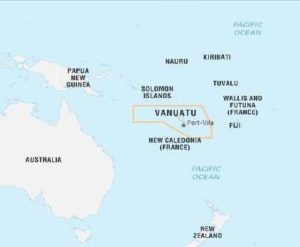UNGA Resolution and Its Impacts on Climate Change
Why in news?
Recently, United Nations General Assembly (UNGA) passed a resolution asking the ICJ to give an advisory opinion about obligations of countries to protect people from climate extremities based on the promises they have made to the UNFCCC.
How vulnerable are countries to climate change?
According to German Watch Institute, Japan, Philippines and Germany and small island nations are the most affected countries by climate change today.
- According to Emissions Gap Report 2022.
- The world must cut emissions by 45% to avoid global catastrophe.
- The world is far off track to limiting global warming to 5°C the most-ambitious target set out by the Paris Agreement.
What is the resolution about?

- The resolution was passed by the Pacific Island of Vanuatu and supporters that was devastated by Cyclone Pam in 2015.
- It prepared the draft resolution that was eventually co- sponsored by 132 countries at the UNGA and went through without a vote.
- The draft resolution invoked Article 96 of the N. Charter to ask the ICJ to deliberate on two questions.
- What are the obligations of states under international law to ensure the protection of the climate system.
- What are the legal consequences under these obligations for states that have caused significant harm to the climate system, particularly for Small Island Developing States (SIDS).
The resolution refers to several international protocols including the Paris Agreement (2015), the United Nations Convention on the Law of the Sea and even the Universal Declaration of Human Rights.
What is India’s position in the resolution?
- India did not join the majority of countries that co-sponsored the draft resolution.
- India is also watching how global powers like the S. and China respond to the resolution.
- Indian officials have said that the ICJ process can only speak about climate change issues and problems broadly and cannot name or profile any one country in the process.
What is the jurisdiction of international court of justice (ICJ)?
- ICJ is the highest global court recognized by all 193 UN members.
- It is composed of 15 judges elected to 9 year terms of office by the United Nations General Assembly and the Security Council.
- The President and Vice-President are elected by the Members of the Court every three years by secret ballot.
- The Court is not composed of representatives of the government.
There are two types of ICJ jurisdictions.
- Contentious jurisdiction – Resolving legal disputes between consenting states
- Advisory jurisdiction – The UNGA, the Security Council and other specialized bodies of the organization can request the ICJ for an opinion on a legal question.
- The ICJ’s advisory opinions are non-binding but carries legal weight and moral authority.
- Advisory opinions given in the past on the Palestinian issue (Construction of the Wall), nuclear threats and on the dispute between the K. and Mauritius over the Chagos Islands have been respected.
